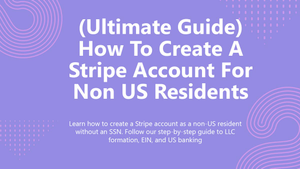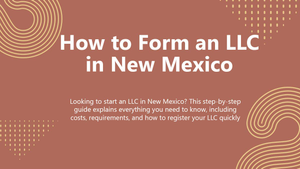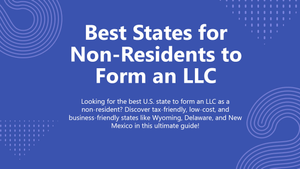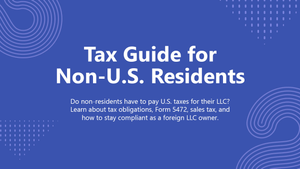Tax Guide for Non-U.S. Residents with an LLC in the U.S
Starting a business in the U.S. as a non-resident can be a strategic move for global entrepreneurs. However, one of the biggest concerns for non-U.S. residents forming an LLC is taxation. Many business owners wonder:
Do I have to pay U.S. taxes if I own an LLC?
What forms do I need to file?
How does the IRS treat my income if I don’t live in the U.S.?
Are there any tax advantages to forming an LLC as a non-resident?
In this guide, we’ll break down everything you need to know about U.S. taxation for foreign LLC owners, helping you navigate the process while staying compliant.
Do Non-Resident LLC Owners Pay U.S. Taxes?
The U.S. tax system differentiates between effectively connected income (ECI) and U.S. source income (USSI) for foreign-owned businesses. Your LLC’s tax obligations depend on these key factors:
No U.S. Presence, No U.S. Employees, No U.S. Office: If you operate a business entirely outside the U.S., with no dependent agents, physical office, or U.S. employees, then your LLC is likely not subject to U.S. income tax. However, annual reporting is still required.
Selling Products to U.S. Customers: If you sell goods to U.S. customers but do not have a physical presence or a dependent agent in the U.S., you are typically not subject to federal income tax, but sales tax obligations may apply.
Using U.S. Payment Processors (Stripe, PayPal, etc.): Simply using a U.S.-based payment processor does not automatically create a taxable presence.
Marketplace Sellers (Amazon FBA, Etsy, eBay, etc.): If a marketplace issues a 1099-K form, you may need to file a tax return, but this does not always mean you owe taxes.
Consulting, Digital Services, or SaaS Business: If you provide services to U.S. clients but do not work in the U.S. or have U.S.-based staff, your income is generally not subject to U.S. taxation.
Annual Reporting Requirements for Non-Resident LLC Owners
Even if you don’t owe U.S. taxes, you must still file certain IRS forms every year to remain compliant:
Form 5472 & Form 1120 (For Single-Member LLCs Owned by Non-Residents)
If your LLC is a Single-Member LLC (SMLLC) owned by a non-U.S. person, it is classified as a disregarded entity for tax purposes.
You are required to file Form 5472 and a pro-forma Form 1120 each year to report foreign ownership.
Failing to file this form can result in a minimum $25,000 penalty.
Form 1040-NR (If Required)
If you receive a 1099-K form from a payment processor or marketplace, you may be required to file Form 1040-NR (Non-Resident Tax Return).
State-Specific Tax Requirements
Some states, such as California, have additional LLC taxes and annual fees.
States like Wyoming, New Mexico, and Delaware have no state income tax for LLCs with no in-state activity.
Understanding Nexus & Sales Tax Obligations
Even if your LLC is not subject to U.S. federal income tax, you may still need to collect and remit sales tax in certain situations.
What is Economic Nexus?
If you exceed a certain number of sales transactions or revenue threshold in a U.S. state, you may establish economic nexus.
This means you must collect sales tax from customers in that state.
Platforms like Shopify, Amazon, and Etsy handle this automatically for sellers, but you should verify compliance.
Choosing the Right State for Your LLC
The best state for forming your LLC as a non-resident depends on your business needs. Here are some top choices:
Wyoming: No state income tax, strong privacy laws, low annual fees.
New Mexico: No annual reporting requirements, cost-effective.
Delaware: Business-friendly, strong legal protections.
Frequently Asked Questions (FAQ) for Non-U.S. Residents
1. Do I have to pay U.S. income tax if I don’t live in the U.S.?
If your LLC does not have a U.S. office, employees, or dependent agents, you likely do not owe U.S. federal income tax, but you must still file IRS forms annually.
2. What is Form 5472, and why do I need to file it?
Form 5472 is required for single-member LLCs owned by non-U.S. residents to report foreign ownership to the IRS. Failing to file can result in penalties.
3. Do I need an EIN for my LLC?
Yes, an EIN (Employer Identification Number) is required to open a business bank account and file necessary tax documents.
4. Will I be taxed if I sell digital products or services to U.S. customers?
If you have no U.S. presence, your income from digital products is generally not subject to U.S. income tax.
5. What is sales tax, and do I need to collect it?
Sales tax is collected at the state level. If you exceed economic nexus thresholds, you may be required to collect and remit sales tax.
6. Does my LLC have to pay taxes in the state where it is registered?
Most states do not tax LLCs unless they have in-state activities. However, California has an $800 annual minimum franchise tax.
7. How do I report my foreign LLC ownership to the IRS?
Single-member LLCs must file Form 5472 with a pro-forma Form 1120 annually.
8. Can I use Stripe or PayPal without paying U.S. taxes?
Yes, using a U.S.-based payment processor does not create a taxable presence on its own.
9. If I sell on Amazon FBA, will I owe taxes?
If Amazon issues a 1099-K, you may need to file a tax return, but this does not always mean you owe taxes.
10. Can a non-resident open a business bank account in the U.S.?
Yes, many U.S. banks allow non-residents to open business accounts, but requirements vary.
Final Thoughts
Forming a U.S. LLC as a non-resident is a smart move for many entrepreneurs, but tax compliance is crucial. To ensure everything is handled properly, consider working with a CPA or tax professional who specializes in non-resident taxation.
🚀 Need help setting up your U.S. LLC? Check out our recommended LLC formation services to start your business today!




